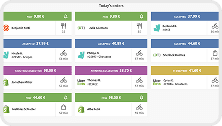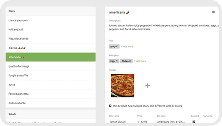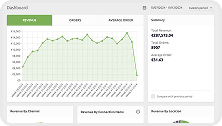Just Eat Flyt Bridge
- home
- Apps
- Just Eat Flyt Bridge
- Receive Orders

Receive Orders
Connecting Just Eat to HubRise allows you to receive Just Eat orders directly in your EPOS or any other solution connected to your HubRise account.
This page describes the information Just Eat sends to HubRise. It helps you understand how orders will be received on your EPOS.
Order Transmission
The Just Eat OrderPad will need to remain switched on to receive orders in HubRise. For more information, see Can I Turn Off the Orderpad?.
Orders can either be manually accepted on the OrderPad, or auto-accepted in some Just Eat markets. For more information, see Do I Want Auto-Accept Activated?
Once an order is accepted, Just Eat sends it to HubRise when one of the following conditions is met:
- A courier is assigned to the order.
- The time the order must be ready minus the preparation time has been reached.
For example, if preparation time is set to 7 minutes and the order must be ready by 7:00 PM, the order is sent to HubRise at 6:53 PM, unless a courier is assigned earlier.
You can customise this behaviour in two ways:
- Adjust the preparation time from the Just Eat OrderPad.
- Request immediate transmission of orders. To enable this option, contact your Just Eat account manager.
Order Statuses
IMPORTANT NOTE: In this section, we capitalise the first letter of Just Eat statuses to make them easier to distinguish from HubRise status names. For example, Successful is a Just Eat status, while accepted is a HubRise status.
Just Eat Statuses
Just Eat orders can be marked as:
Successful: The order has been accepted by the EPOS.Failed: The order could not be sent to the EPOS.
New orders must be marked as Successful or Failed within 3 minutes, otherwise Just Eat automatically marks them as Failed.
You can only update the status of an order once. Further changes are ignored by Just Eat.
When the Status Changes in HubRise
When the status of an order changes to rejected or cancelled in HubRise, Just Eat Bridge notifies Just Eat that the order is Failed.
Just Eat Bridge lets you decide which HubRise status triggers the Successful status on Just Eat. This is useful to handle different scenarios when your EPOS updates the order status. For example, if your EPOS marks an accepted order as received on HubRise, you can still notify Just Eat that the order has been accepted.
Other HubRise status values are not supported and are not sent to Just Eat.
When the Status Changes in Just Eat
Just Eat Bridge updates order statuses in HubRise in the following cases:
- When an order is cancelled on Just Eat, it is immediately marked as
cancelledin HubRise. - For orders delivered by Just Eat, the order status is updated to
in_deliverywhen the driver leaves the restaurant, and tocompletedonce the order has been delivered.
Delivery Tracking
For orders delivered by Just Eat, the Bridge keeps HubRise updated with the delivery progress. Each time the delivery moves to a new state (for example, driver en route, driver arrived, delivered), the Bridge updates the corresponding Delivery resource attached to the HubRise order.
The delivery status is updated according to the following mapping:
| Just Eat status | HubRise Delivery status |
|---|---|
driverArrivingAtRestaurant | pickup_enroute |
driverAtRestaurant | pickup_waiting |
onItsWay | dropoff_enroute |
delivered | delivered |
Service Types
Just Eat supports three service types:
- Delivery by Just Eat riders
- Delivery by the restaurant's fleet
- Customer collection
These are typically associated with specific ref codes in your EPOS, which you can set in the Configuration page of the Bridge. For more information about ref codes, see your EPOS documentation in our apps page.
Order Times
For restaurant delivery orders, Just Eat provides the time the customer expects the order to be delivered.
For other types of orders, it provides the time the order should be ready for pickup, either by the customer or a delivery rider.
In both scenarios, this time is transmitted to HubRise as the expected_time field. This time cannot be changed by the EPOS.
Customer Details
The customer's details provided by Just Eat depend on the service type for the order.
- For orders delivered by the restaurant, HubRise receives the customer name and address.
- For pick-up orders, only the customer name is received.
- For orders delivered by Just Eat, the customer name may be received, depending on the market. The address is never received.
Items and Options
Just Eat orders contain the complete information about items and options, including name, POS ref code, quantity, and price.
Customers' comments on single products are not supported on Just Eat. If you rely on these comments for cooking or serving instructions (for example, "Medium rare cooking", or "Cut in slices"), you should add the corresponding items in your EPOS and include them as options in the Just Eat menu, so that they are correctly encoded.
Discounts
Discounts are not supported on Just Eat, and no information is provided in the API.
Charges
Just Eat Flyt Bridge encodes two types of charges: Delivery charge, and service surcharge.
Technical Reference
This section describes how orders are encoded in the JSON payloads you receive from Just Eat Flyt Bridge.
Just Eat Order ID
When a new order is created on HubRise, the Just Eat order ID is stored in the collection_code field.
This is the order reference ID that the customer sees on the platform.
Items Encoding
For every item in the order, Just Eat Flyt Bridge provides the following information:
sku_ref: The ref code of the itemproduct_name: The product nameprice: The price for a single itemquantity: The quantity of items included in the orderoptions: The array of options attached to the item
Options Encoding
For every option in the order, Just Eat Flyt Bridge provides the following information:
option_list_name: The placeholder for the option list name, with default valueOptionsref: The ref code of the optionname: The option nameprice: The price for a single option
Every option has single quantity. Multiple identical options are encoded in separate option objects.
Sample JSON containing a single item with an option
"items": [ { "product_name": "Crispy Chilli Chicken", "sku_ref": "2473", "price": "12.95 EUR", "quantity": "1", "options": [ { "option_list_name": "Options", "name": "Egg Fried Rice", "ref": "2043", "price": "0.35 EUR" } ] }]
Customer
Just Eat Flyt Bridge never creates customers on HubRise for Just Eat orders, but always includes the customer's details in the customer object, when they are available.
The customer's name is provided in the first_name and last_name fields. A customer might decide to leave blank one of the two fields, so this might remain empty in the payload.
The default placeholder customer@email.hidden is used to populate the email field for all customers.
For restaurant delivery orders only, Just Eat Flyt Bridge receives the following information from Just Eat:
address_1: The first line of the address.address_2: The second line of the address.city: The city of the address.postal_code: The postcode of the address.latitude: The latitude of the address.longitude: The longitude of the address.phone: Just Eat support number. Note: This is not the customer's phone number.delivery_notes: The delivery notes that the customer includes at checkout.
Sample JSON with customer details
"customer": { "email": "customer@email.hidden", "first_name": "Jane", "last_name": "Black", "phone": "0131 000 0000", "address_1": "2 High St", "address_2": "", "postal_code": "EH1 1PG", "city": "Edinburgh", "delivery_notes": "Don't ring the bell", "latitude": "55.949779", "longitude": "-3.190822" }
Delivery Charges
Delivery charges are applied for orders delivered by the restaurant.
The available fields in the payloads are the following:
name: The name of the delivery charge, which isDelivery chargeby default.type: The type of charge. It has always the valuedelivery.ref: The ref code of the charge. Its default value can be set from the Configuration page of Just Eat Bridge and should match the value in your EPOS.price: The total amount of the delivery charge.
Just Eat Surcharge
Just Eat applies a fixed surcharge to all the orders.
The available fields in the payloads are the following:
name: The name of the charge, which isService chargeby default.type: The type of charge. It has always the valueother.ref: The ref code of the charge. Its default value can be set from the Configuration page of Just Eat Bridge and should match the value in your EPOS.price: The total amount of the small order surcharge.
Sample JSON for charges
{ "charges": [ { "type": "delivery", "name": "Delivery charge", "ref": "1111", "price": "3.50 EUR" }, { "type": "other", "name": "Service charge", "ref": 2222, "price": "0.50 EUR" } ]}
Total Price
The total price paid for the order, including charges applied, is encoded in the total field.
Pause
When order acceptance sync is enabled, Just Eat Flyt Bridge syncs the order_acceptance field from HubRise to Just Eat.
The order_acceptance.mode field controls the store status: normal or busy keeps the store open, while paused closes it.


